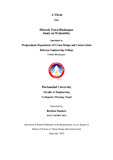Please use this identifier to cite or link to this item:
https://elibrary.khec.edu.np:8080/handle/123456789/520Full metadata record
| DC Field | Value | Language |
|---|---|---|
| dc.contributor.advisor | Ar. Biresh Shah, Ar.Libash Phaju | - |
| dc.contributor.author | Dumaru, Reshma | - |
| dc.date.accessioned | 2023-06-09T09:43:21Z | - |
| dc.date.available | 2023-06-09T09:43:21Z | - |
| dc.date.issued | 2022-09 | - |
| dc.identifier.uri | https://elibrary.khec.edu.np/handle/123456789/520 | - |
| dc.description.abstract | Walking is known as sustainable types of transportation. The effectiveness of “walkability” in traditional urban spaces and analyze the relationship between walking safe and secure environment. The traditional town like Bhaktapur was never designed for motorized vehicles. The town was designed for daily activities of the people in human scale. The narrow streets leading towards the large urban space has its different character and identity. The historic town consists of Public Square, Monuments, urban facilities like pati, sattal, dhungedhara, hierarchy of streets and settlements in Mandala form which is identity of the town. The jatras and festivals celebrated in the streets and urban space. The historic core area of Kathmandu valley was designed of pedestrian friendly but with the urbanization the walking environment of historic core area decreases. The change of people’s lifestyle, changing in economy and change in social and religious belief, the Bhaktapur historic town moves towards modernization for different facilities and Public amenities. As a result, the streets once full of pedestrian is now full of vehicular traffic. The urban spaces used for cultural programs, festivals and dances are now use as a parking area for the locals as well as visitors. This research aims and objectives is to study the change of street life and its impact on urban space of the whole city and to analyze the movement of vehicles and pedestrian and analyze issues and problems regarding vehicular movement in Bhaktapur core area. The research targets to solution oriented study and to make the city walkable again. The study includes the required literature studies and national and international case studies on pedestranization. The method of data collection consists of different sources- Primary and Secondary data. The methodology includes observation, interview, Questionnaire, Survey analysis of local residents, visitors as well as retail shopkeeper as a respondents. The data collection also includes maps, drawings and images. The study is carried out in the main street of Bhaktapur known as Bazar line. It not only includes street but also it includes the urban space of the city. The research includes the plans of making city walkable by addressing the challenges and issues and implementing effective plan and policies. | en_US |
| dc.language.iso | en | en_US |
| dc.title | Historic Town Bhaktapur Study on Walkability | en_US |
| dc.type | Thesis | en_US |
| local.college.name | Khwopa Engineering College | - |
| local.degree.name | MSc in Urban Design and Conservation | - |
| local.degree.level | Masters | - |
| Appears in Collections: | Master of Science (M.Sc) in Urban Design and Conservation | |
Files in This Item:
| File | Description | Size | Format | |
|---|---|---|---|---|
| Reshma-Dumaru-report (1).pdf Restricted Access | 7.19 MB | Adobe PDF |  View/Open Request a copy |
Items in DSpace are protected by copyright, with all rights reserved, unless otherwise indicated.
